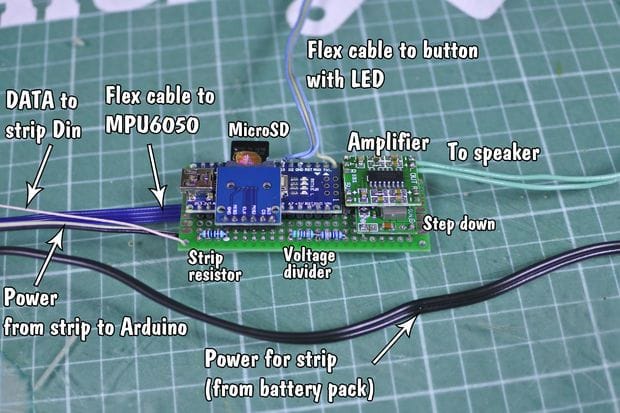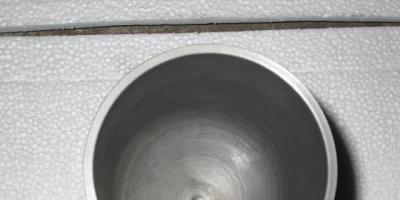Hello everyone!) A lightsaber is an integral attribute of the Star Wars films, a cult craft that every person who calls himself a fan should have. Star Wars"and follower of Obi-Wan Kenobi...
For years I wanted to get my hands on the "original" lightsaber. However, the industrial designs that were presented on the market did not meet the requirements I had stated (I didn’t even want to take on a plastic likeness of the majestic artifact). So I had an idea do their hands a sword that would suit my desires and look unsurpassed.

In the article we will consider in detail how and from what parts it will be possible to make this homemade.

Some of the parts used can be replaced with plastic pipes, but then the parts will lose some of their strength and the effect of realism will be reduced.

This sword glows and changes colors (no light or sound effects). With the right skill set, you can easily add additional functions into this product.
Step 1: Required Materials and Tools

I want to immediately dot all the “E”s, I am not a plumber or a seller of plumbing products, so the names below may be incorrect.
- 32 inch (81.28 cm) long clear plastic pipe;
- Inch metal pipe;

- Inch connector detachable coupling;

- LED RGB strip;

- Two inch straight couplings;
- Selector switch (we only need a nut)

- A washer that needs to be secured to the selector switch nut.

- Inch squeegee

- Wax paper

- Long wooden dowel approximately 3/4" in diameter and 32" long.
- Super glue, epoxy resin, silicone glue.
- Engraver, soldering iron, drill, hammer and set of precision screwdrivers.
- Small switch
- A small 3-position switch that will be used to change the color of the blade's glow.

- 9 volt battery with connector and soldered leads.

- The main resource is patience!
Step 2: Assembling the battery holder (top)

Using glue, we attach the straight coupling, the nut from the selector switch and the washer together.
Since the power source is a 9-volt battery, it is necessary to find a way to secure and hide it in the hilt of the sword.
Unfortunately, the inch pipe is too narrow to fit, but the inch coupling fits just right. To prevent the battery from falling out and not “damage” the battery itself, we secure the nut and washer (after gluing them with glue) to one end of the coupling.
Once the glue has dried, check the quality of the seam and, if necessary, glue everything again.
Step 3: Assembling the guard

We disassemble the split coupling and select the part that we like best.

We twist together: part of the split coupling, the bend and the straight coupling.
Step 4: Handle

Let's take an inch pipe and cut a piece of any length (the main thing is that you feel comfortable) taking into account the fact that you will need to attach the guard and pommel to it.
Step 5: Blade

Let's take a polycarbonate tube and install it in the guard. Leave space in the guard for switches.
The copper wire will not only help securely secure the blade, but will also make the sword stand out thanks to its own unique design.

After installing the blade tube, we will drill through holes the same diameter as copper wire. Let's cut it into small pieces and then mount it as shown in the photo. Then use super glue to securely fix it.
Step 6:

Step 7: Prepare the guard for installing the switch

First, decide where you want to place the switch or switches. Since I wanted the sword to glow in different colors, I had to install two different switches. One is power, the second is color switching.
Let's install switches at the top of the guard so that the copper wires protect them in the heat of battle.
I drilled, cut and sharpened the guard, getting two large enough holes to fit the switches.
We don’t secure them yet, otherwise we won’t be able to connect the wires to the LEDs.
Step 8: LEDs and Dowel

Let's take a strip of LEDs and cut a section about twice as long as the expected length of the blade. lightsaber(make sure you cut the tape in right place- along the cutting line).
The strips should have a 4 color pinout pinout attached to one end (most likely red, green, blue and white).
Let's strip the ends of the wires. We hold the white wire on the positive terminal of the battery, and the remaining wires (individually or all at once) on the negative terminal.
Let's fold the strip of LEDs in half and pass it along the blade. Then place a wooden dowel in plastic pipe. The tape will be sandwiched between the pipe and the dowel.
Let's pass the wires through the guard and solder them where necessary. Let's secure the switches.
Step 9: Final Touches

Finally, we’ll add a diffuser to diffuse the light from the LED strip.
It would be possible to paint the blade with white paint.... but I decided to save great view and just used wax paper.
Let's twist a tube of paper of sufficient width and length so that it fills the tube and slides along inside blade around the double-sided LED strip.
It will take a little effort, but in the end you will get great results.
I filled the top of the blade with silicone to seal the plastic tube.
May the force be with you.
If you are a Star Wars fan, then you simply need to get your own. There is no need to buy it at all, since this “weapon” can be made independently from parts that are very easy to get. The photo report and instructions that await you below will tell you how to make a lightsaber with your own hands.
We buy these diodes in quantities of 110 pieces.

We solder in parallel (here the solder is divided into 4 parts).

The division into 4 parts is made so that you can connect all 110 diodes to 4 batteries with a power of 3.6V each. 350mA driver.

Since a strip of 110 diodes is divided into 4 parts, then each part (~26 diodes) carries 350mA. 14ma for each diode. Chrome plated steel cylinder with a diameter of 30mm and a length of 250mm. It will hide batteries and wires.

The blade itself is a polycarbonate tube with a diameter of 30mm, a wall thickness of 2.5mm and a length of 1000mm.

A white packaging film and diode strip are placed inside this tube.

The bottom cover is printed on a 3D printer, where the power button will be located.

Back in 1976, the first creation of George Lucas appeared on the screens - the beginning of the Star Wars saga. The author's fantastic idea captured the hearts of people who became ardent fans of the film. Every girl dreamed of being like Princess Leia, and boys imitated the heroic warriors. We invite you to make a Jedi sword with your own hands. It would make a great toy for a little fan or complement the role play of an adult Star Wars fan.
Sword from a lantern
In order to create Jedi swords for children, you need to choose safe materials. Most suitable option— make a toy weapon from a simple flashlight. It should fit comfortably in the baby's hand. It's better to choose lighting fixture, inside of which there are diodes. They are durable and consume minimal energy, so you won't need to change batteries often. Make sure the flashlight produces colored light. If you don’t find one, don’t be upset: you can remove the glass and paint the diode in the desired shade with ordinary nail polish.
Second integral part The toy sword consists of a polycarbonate tube and a small plastic plug. Adjust the length of the blade yourself by trying it on with your child. 60-80 cm will be enough. The cross-section of the pipe should be slightly smaller than that of the flashlight. You will also need hot glue or transparent “Moment” and electrical tape.
Assembling the toy
Assembling a formidable laser sword is quite simple. First, prepare the blade. Polycarbonate is transparent, and you need a material that will diffuse the rays. To make the tube matte, go over it carefully sandpaper. Using hot glue, attach the cap to the top of the blade. Remove the glass from the flashlight and fit the tube to the handle. If it does not fit tightly inside, make several turns of electrical tape. Secure the blade with glue to the top of the lantern. All that remains is to check the toy in operation. Your child will jump with happiness! Create Jedi swords for his friends, and they can play against the forces of evil.

Such a weapon, made with your own hands, will cost you little (unlike offers in toy stores, where the price is very steep), and you will spend a minimum of time on its manufacture.
LED strip sword
To make a lightsaber you will need:
- LED strip, or It has a lot of advantages, including safety, durability and low energy consumption. The price depends on the width of the tape and the number of diodes. On average, it ranges from 350 to 500 rubles per meter. A wide range of glow shades will make it easy to determine the color of radiation that your Jedi swords will emit.
- Metal lantern. You do not need this device as an illuminator; it will serve as a reliable handle for a formidable weapon. When choosing, rely on color, design, size. It is important that the handle fits comfortably in the palm of your hand, and that the inverter easily fits into the inner tube.
- A tube. As in the previous version, use a piece of polycarbonate treated with sandpaper. Make sure there is a plug at the end.
- Inverter. This is a special battery for flexible neon. There are button batteries inserted inside a small box.
In addition, you will need hot or instant glue and electrical tape.
Preparatory part
Now let's look in more detail at how to make a Jedi sword. First you have to “gut” the flashlight. Carefully remove the insides. See if the inverter fits inside the tube. If yes, then everything is great!
Remember that the cross-section of the tube should be slightly smaller than that of the top of the lantern. Choose the blade size yourself. Sand the ends of the plastic with sandpaper, as it is very easy to cut yourself on them.

Assembly
The size should be slightly larger than the tube. Use hot glue to secure one end to the cap that will cover the top of the weapon. The tape should be inside the polycarbonate tube. Jedi swords glow evenly along their entire length; cold neon will give you this effect.
To connect the tape to the inverter, you just need to insert the connectors into each other. No soldering or additional manipulations are required, which is very convenient. Check the lighting operation.
To ensure that the sword serves you for a long time, carefully fix the inverter inside the tube using hot glue. This way it will not dangle and hit the walls of the case.
All that remains is to carefully insert the tube into the base of the handle and secure it with glue. The lightsaber is ready! This option is suitable for both role-players and children.

To those on the dark side
Fans of insidious images also need Jedi swords. After all, the Sith simply switched over and created their own order. Darth Maul wielded dual weapons, which provided an element of surprise in battle. His red lightsaber frightened everyone who came across the dark lord on the way.

As you may have guessed, it will not be difficult to make. You just need to collect two swords with a red neon ribbon. Please note that their blades should be slightly shorter. Connect the flashlight handles together using black electrical tape. Make the winding strong so that the parts do not dangle. You can first fix their bases" second glue", and then go over it with black insulating tape.
Conclusion
Now you know how to make a Jedi sword with your own hands. Real fans turn metal hilt parts on lathes.

They use special compounds to treat steel to achieve a realistic effect. Thanks to the assembly process described in the article, you can continue on your journey to making formidable weapons to protect the universe.
A lightsaber for games can be made from scrap materials. You will get a very presentable final result, the sword will glow amazingly in the dark and will be the perfect addition to a Star Wars character's costume. At the same time, it will only take you a few minutes to get to work!
Steps
Lightsaber made from flashlight, paper and cellophane
-
Find a classic flashlight that emits white light. The brighter it is, the better. If the flashlight is too weak, the sword may not work. Most flashlights that can be found somewhere at the bottom of a drawer useful little things, should fit without any problems.
- If you find that the flashlight is too dim, try changing the batteries as they may be dead.
-
Decide what color your lightsaber will be and find cellophane of the same color. Cut a piece of cellophane that can be used to cover the front glass of the flashlight and secure it with transparent tape.
- Apply cellophane only to the glass of the flashlight. You don't want it to protrude into the body.
-
Find some clean sheets white paper. If necessary, simply remove some paper from the printer tray. It's unlikely that either of your parents will have enough for a few sheets.
- A4 or A3 size paper will suit you. The main thing is that it is clean and white, “may the force be with you.”
-
Wrap one sheet of paper around the top of the flashlight. Along the perimeter, secure the paper to the flashlight with double-folded tape (or just use double-sided tape), since the tape should not be visible from the outside.
- If the sides of the paper overlap each other, you will need to cut them to size. The light should pass through the paper evenly from all sides.
-
Roll up another sheet of paper. Attach it to the first sheet with minimal overlap. Use the same tape technique, taping it from the inside of a second sheet of paper. Continue working in the same way until you have a lightsaber that is long enough.
- If the sword is too long, it may begin to bend. The maximum limit can be only two or three sheets of paper.
-
Make sure that the sword is straight and its parts are securely fastened with tape. Then turn on the flashlight, turn off the main lights and start having fun!
- The paper version of the sword will not withstand real sword duels. Such a sword has more of a decorative meaning and is intended only for bragging rights and not for anything else.
- If you have some free time, make a lightsaber sheath from paper roll tubes paper towels and insert your lightsaber into them.
Lightsaber made from a painted flashlight and plastic tube
-
Color the lantern spray paint in silver color. This flashlight will no longer be usable for anything other than a lightsaber, so get an inexpensive flashlight that won't be needed later.
- Before painting the flashlight with spray paint, cover it with working space newspaper (whether on your driveway or on a table) and protect the glass of the flashlight from paint with regular or masking tape. You cannot get paint on the glass of the flashlight, otherwise you will not see the “light beam” when you turn on the flashlight.
- Paint the entire body of the flashlight silver. You might even want to give the flashlight a few coats of paint. But in reality, painting the flashlight silver is not necessary. Check with the young Jedi you're making the sword for, as he or she may want to cover it in a different color, such as sparkling pink or purple. Independent work above the lightsaber will allow you to make a toy that will fully suit your child’s tastes.
-
Cover the glass of the flashlight with a piece of colored acetate film. Don't worry if you can only find a regular flashlight with a white light. You can give it any color you like using a special color film.
- Place the flashlight head down on the film. Trace the contours of the flashlight on the film so that the resulting circle is slightly larger than the glass of the flashlight.
- Cut out a circle and place it on the glass of the flashlight. The film can be secured with glue, silver tape or even an elastic band (if the circle is large enough for this).
-
Make a sword blade. Make sure the plastic sword tube is the right size for you. Before you buy anything, compare the dimensions of the tube with the dimensions of your flashlight so that it can be easily placed on the flashlight head.
- Using a craft knife, cut the tube to the right size. However, for these purposes (depending on the specific thickness of the tube) you may even need a hacksaw. If your young Jedi is very young, you probably won't want to trust him with a very long sword, so find out what length of sword he can handle comfortably.
- Use the excess tube to cover the tip of the lightsaber. The top of the lightsaber needs to be closed, so use some leftover plastic to create a “lid”. Outline the contours of the tube on the plastic, but make the resulting circle a few millimeters larger so that it completely covers the top of the sword. Attach the circle to the sword transparent glue such as liquid nails or hot glue.
-
Attach the sword blade to the handle. With a little effort and some silver tape, you can create a lightsaber that indicates “the force will be with you.”
- Pull the tube over the head of the flashlight so that it goes inside about 2.5 cm. This must be done so that the tube stays securely on the flashlight and does not fall off as a result of gaming battles.
- Glue the tube to the flashlight using liquid nails or superglue. To put the sword together, you first need to glue the tube to the flashlight. Apply small beads of glue around the perimeter of the flashlight head, and then stretch the tube over it. Leave the sword in a fixed position for a few minutes to ensure it sticks securely.
- Secure the tube to the flashlight with silver sealing tape. You can also use tape of other colors, but if you previously painted the flashlight with silver paint, then you would be better suited namely silver tape. To be safe, wrap tape several times around the junction of the tube and the flashlight, including just above and below the contact line. Warnings
- Be sure to supervise children playing with lightsabers, as the plastic flashlight can cause injury if thrown at someone.
The ritual of creating one's own lightsaber was an integral part of Jedi training and involved not only technological skill, but also harmony with the Force. Ideally, a Jedi needs many months to create the perfect weapon, which he will keep and use until the end of his days. Once created by you, the lightsaber will be your constant companion, your tool, and your means of defense at the ready.
Luke Skywalker
In this article, a DIYer will tell us how to make a Jedi lightsaber with light and sound effects. Created on the Arduino platform, the sword reacts to every movement. Let's watch the video.
Below are the characteristics of the sword.
Light:
-Smooth on/off with lightsaber effect
- Pulsating color with the ability to turn off
Sounds:
-Mode 1: generated noise. The frequency depends on the angular speed of the blade
-Mode 2: Sound hum from SD card
-Slow swing - long hum sound (random from 4 sounds)
-Quick swing - short hum sound (random from 5 sounds)
-Bright white flash when the sword hits the surface
-Play one of 16 sounds when struck
-Weak blow - short sound
-Hard blow - long sound
-After turning on the power, the blade displays the current battery level from 0 to 100%
Battery:
-The battery is low - the lightsaber does not turn on - the power button flashes 2 times
-When the battery runs out during operation, the sword automatically turns off
Control button:
-Hold-on/off sword
-Triple press - color change
-Five clicks to change sound mode
-Selected color and sound mode stored in memory

Tools and materials:
-
-
-
-
-
-
-
-
-
-
-
-
-
-
-
-You can buy a polycarbonate pipe Ø 32 mm with diffusion (dispersion);
-Sewer pipe Ø 32 mm and Ø 40 mm;
-Plastic plugs;
-Everything for soldering;
-Plume;
-Steel wire;
-Double-sided tape;
-Glue gun;
- Fasteners;
-Hacksaw;
-File;
-Ruler;
-Marker;
-Knife;
-Scotch;
-Paper;
-Burner;
-Drill;
-Calipers;
-Cone drill;
-Spray paint;
-Foam rubber;
-Heat shrink;
-Insulating tape;
-Screwdriver;

Step one: connection
According to the diagram on breadboard collects electronics. Solders the contacts with a mounting wire. The buck converter pre-regulates to 4.5 V. The accelerometer is connected separately using a cable.







Step two: firmware
Instructions, firmware, sounds can be taken
or download from the link on this page.
You can configure:
-The number of chips on the tape (if the length of the sword blade changes)
-On/off flicker
-Measure and indicate the resistance of resistors in Ohms
And some other settings.
For the project, the master took MicroSD 4 GB, FAT.
When flashing the assembled sword, you must turn on the power.

Step Three: Batteries
For his project the master used three lithium batteries 18650 with built-in protection.
Solders them in series into one battery. The diameter of the 32 pipe is larger than the battery pack. The author wraps the battery with paper so that it fits tightly into the pipe. Then he heats the surface of the pipe with a burner and quickly cools it. The pipe tapers and takes the shape of a battery. He takes out the battery. He takes off the paper. Now the battery fits tightly into the pipe and does not dangle.








Step Four: LED Strip
Blade length (polycarbonate pipe) 75 cm. The master cuts two pieces of LED strip 75 cm each. Places double-sided tape on the strip. Makes a hole in the top of the tape (without damaging the tracks). Pulls one end of the insulated wire into the hole. Glues the wire to the tape along the entire length of the tape. Glue a second strip of tape on top. The result is a rigid LED design.







Having previously brought the cable out, it secures the accelerometer in the second (lower) plug. Solders wires to LED strip and takes them outside. Secure the wire with a self-tapping screw to the plug. To prevent the tape from dangling in the middle of the tape, use a toothpick to make a transverse stop. Places the polypropylene tube on the bottom plug. Puts on the top cap. Pulls the wire and secures it with a self-tapping screw at the top.






Step five: handle
For the handle, the master used two pieces of pipe, Ø 32 mm and Ø 40 mm, inserted into each other.





Drills holes in the handle for the connector, the power button, the mode selection button and a number of holes in the lower handle of the part for the speaker. Covers the handle with paint.








